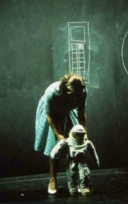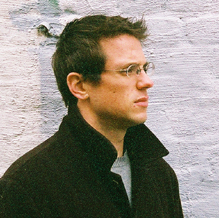 Friday, March 11, 2005
Friday, March 11, 2005
No, not Pink Floyd . . .
I braved the elements Thursday night to catch a performance of Robert Lepage's one-man show the far side of the moon (2000) at the Power Center for the Performing Arts on the campus of the University of Michigan. I'm glad I went. Yves Jacques was sensational. And there was a score by Laurie Anderson.
 the far side of the moon tells the story of Philippe, a man who is coping with both the recent loss of his mother and the estrangement of his only sibling (his younger brother André). Philippe is a university student, who is presenting his Ph.D. thesis proposal for the third time after having it rejected twice before. The subject of Philippe's thesis is Konstantin Tsiolkovsky (1857-1935), a Soviet rocket pioneer who proposed building an elevator that would take humans into space so they could observe the Earth. This fanatical idea, which Philippe endorses (although he proposes building it on the far side of the moon so we wouldn't, or rather couldn't, look at the Earth) along with the Soviet-American "space race," the SETI program (Search for Extra-Terrestrial Intelligence), and memories from childhood and adolescence frame Philippe's journey, which seeks to answer the fundamental question, "Are we alone?" the far side of the moon tells the story of Philippe, a man who is coping with both the recent loss of his mother and the estrangement of his only sibling (his younger brother André). Philippe is a university student, who is presenting his Ph.D. thesis proposal for the third time after having it rejected twice before. The subject of Philippe's thesis is Konstantin Tsiolkovsky (1857-1935), a Soviet rocket pioneer who proposed building an elevator that would take humans into space so they could observe the Earth. This fanatical idea, which Philippe endorses (although he proposes building it on the far side of the moon so we wouldn't, or rather couldn't, look at the Earth) along with the Soviet-American "space race," the SETI program (Search for Extra-Terrestrial Intelligence), and memories from childhood and adolescence frame Philippe's journey, which seeks to answer the fundamental question, "Are we alone?"
Anderson's score is out of this world. It serves as the perfect compliment to the sense of lonliness and melocholy projected throughout the performance. Her textures range from middle-eastern sounding violin lines played above an ambient electronic drone, barren electronic landscapes, and desconstructed funk. The music during the plane sequence as Philippe flies to Moscow was particularly stirring. This is vintage Laurie Anderson--sublimely beautiful and moving. It gave me goosebumps. In addition to Anderson's score, there's also music by Led Zepplin, John Coltrane ("Naima"), and Beethoven (yes, the "Moonlight" sonata).
My only complaint is that UMS billed the show as a companion of sorts to The Elephant Vanishes: "If you loved last fall's production of The Elephant Vanishes, you won't want to miss the far side of the moon." I did love last fall's production of The Elephant Vanishes, except that it's very different from the far side of the moon. Elephant, which is based on three short stories by the Japanese author Haruki Murakami, is a technical and multimedia marvel. The opening sequence, meant to evoke the chaos and complexity of postmodern life in Tokyo, was simply breathtaking. I'd never seen anything quite like it and was almost in tears. Quite the contrary, far side doesn't have any of the high-tech wizardry that makes Elephant such eye candy--all the projected video is old archival footage of Russian cosmonauts and American astronauts; there are cheap puppets; and nobody tries to hide any of this. Yet the story is every bit as gripping and moving. But because of the advertising, it took me about 30 minutes to settle into far side's rhythm. Once I did settle in though, I was transported.
posted by Brian Sacawa
10:01 PM
|
|
 Praised by The New York Times as "an inventive musician . . . fresh and surprising," saxophonist Brian Sacawa has firmly established himself as an important contemporary voice for his instrument. He is active as a soloist, recitalist, and chamber musician throughout the United States and is the co-founder of the new music duo Non-Zero with percussionist Timothy Feeney.
Praised by The New York Times as "an inventive musician . . . fresh and surprising," saxophonist Brian Sacawa has firmly established himself as an important contemporary voice for his instrument. He is active as a soloist, recitalist, and chamber musician throughout the United States and is the co-founder of the new music duo Non-Zero with percussionist Timothy Feeney.
He has given premieres of over thirty works by both established and emerging composers, including Michael Gordon, Bright Sheng, Andrew Mead, Oliver Schneller, Ken Ueno, Beata Moon, Hillary Zipper, and Scott McAllister, among many others. Named the Baltimore CITYPAPER’s Critic’s Choice for Classical Music in 2002, he is the recipient of awards for solo performance from both national and international competitions.
Sacawa's versatile career has led to appearances with the St. Petersburg Philharmonic, the Detroit Symphony Orchestra, the New World Symphony, Harvard Group for New Music, New Music Brandeis, Bargemusic, and at meetings of the ISU Contemporary Music Festival, World Saxophone Congress, North American Saxophone Alliance, and New England Saxophone Symposium.
Brian holds degrees from the University of Michigan, the Peabody Conservatory, and the University of Massachusetts – Amherst, where he studied with Donald Sinta, Gary Louie, and Lynn Klock. He has recorded for the Equililbrium, Naxos, and BiBimBop recording labels.
See Brian's other blog
Sounds Like Now
| |



